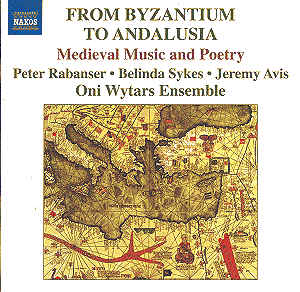|
|
Search MusicWeb Here |
|
 |
||
|
Founder:
Len Mullenger (1942-2025) Editor
in Chief:John Quinn
|
|
|
Search MusicWeb Here |
|
 |
||
|
Founder:
Len Mullenger (1942-2025) Editor
in Chief:John Quinn
|

BUY NOW
|
From Byzantium to
Andalusia. Medieval Music and Poetry ANONYMOUS Kyrie eleison (Christian-Arabic Tradition, Lebanon) [3:21] Fa mi cantar l'amor di la beata (Laudario di Cortona (Ms. 91, Biblioteca Comunale di Cortona)) [6:47] De la crudel morte de Cristo (Laudario di Cortona (Ms. 91, Biblioteca Comunale di Cortona)) [1:59] Laude novella(Laudario di Cortona (Ms. 91, Biblioteca Comunale di Cortona)) [3:49] Sallalahu ala Muhammed (Yunus Emre (Ilahileri), Turkey, 13th century) [4:42] Pesrev (Yunus Emre (Ilahileri), Turkey, 13th century) [1:29] Ey Derviccsler (Yunus Emre (Ilahileri), Turkey, 13th century) [4:59] Plangiamo quel crudel basciare(Laudario di Cortona (Ms. 91, Biblioteca Comunale di Cortona)) [4:07] Venite a laudare (Laudario di Cortona (Ms. 91, Biblioteca Comunale di Cortona)) [2:40] Keh Moshe (Traditional Jewish, 12th century [1:44] Adon Haselihot (Traditional Sephardic, pre-1492) [3:21] Galeas, mis galeas (Traditional Sephardic, pre-1492) [3:48] Jalla man (Traditional Andalusian School) [4:07] Stella splendens in monte (Llibre Vermell de Montserrat, Catalonia, 14th century) [8:23] O Maria, d'omelia (Laudario di Cortona (Ms. 91, Biblioteca Comunale di Cortona)) [5:00] Peter Rabanser (voice, bagpipe, duduk, ud) Belinda Sykes (voice) Jeremy Avis (voice) rec. Grosse Sendesaal, Hessischer Rundfunk, Frankfurt, December 2001 |
Error processing SSI file |
|
|
Return to Index |